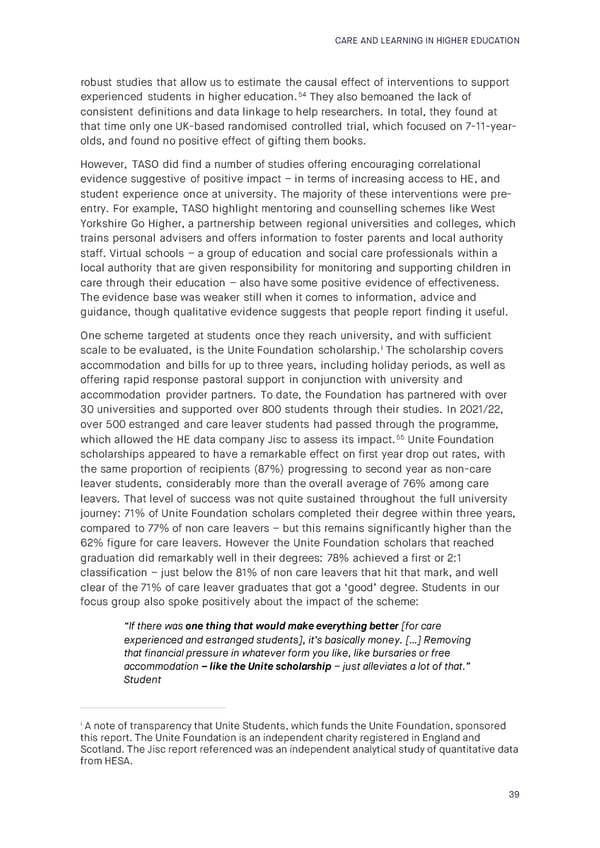CARE AND LEARNING IN HIGHER EDUCATION robust studies that allow us to estimate the causal effect of interventions to support experienced students in higher education.54 They also bemoaned the lack of consistent definitions and data linkage to help researchers. In total, they found at that time only one UK-based randomised controlled trial, which focused on 7-11-year- olds, and found no positive effect of gifting them books. However, TASO did find a number of studies offering encouraging correlational evidence suggestive of positive impact – in terms of increasing access to HE, and student experience once at university. The majority of these interventions were pre- entry. For example, TASO highlight mentoring and counselling schemes like West Yorkshire Go Higher, a partnership between regional universities and colleges, which trains personal advisers and offers information to foster parents and local authority staff. Virtual schools – a group of education and social care professionals within a local authority that are given responsibility for monitoring and supporting children in care through their education – also have some positive evidence of effectiveness. The evidence base was weaker still when it comes to information, advice and guidance, though qualitative evidence suggests that people report finding it useful. One scheme targeted at students once they reach university, and with sufficient scale to be evaluated, is the Unite Foundation scholarship.i The scholarship covers accommodation and bills for up to three years, including holiday periods, as well as offering rapid response pastoral support in conjunction with university and accommodation provider partners. To date, the Foundation has partnered with over 30 universities and supported over 800 students through their studies. In 2021/22, over 500 estranged and care leaver students had passed through the programme, which allowed the HE data company Jisc to assess its impact.55 Unite Foundation scholarships appeared to have a remarkable effect on first year drop out rates, with the same proportion of recipients (87%) progressing to second year as non-care leaver students, considerably more than the overall average of 76% among care leavers. That level of success was not quite sustained throughout the full university journey: 71% of Unite Foundation scholars completed their degree within three years, compared to 77% of non care leavers – but this remains significantly higher than the 62% figure for care leavers. However the Unite Foundation scholars that reached graduation did remarkably well in their degrees: 78% achieved a first or 2:1 classification – just below the 81% of non care leavers that hit that mark, and well clear of the 71% of care leaver graduates that got a ‘good’ degree. Students in our focus group also spoke positively about the impact of the scheme: “If there was one thing that would make everything better [for care experienced and estranged students], it’s basically money. […] Removing that financial pressure in whatever form you like, like bursaries or free accommodation – like the Unite scholarship – just alleviates a lot of that.” Student i A note of transparency that Unite Students, which funds the Unite Foundation, sponsored this report. The Unite Foundation is an independent charity registered in England and Scotland. The Jisc report referenced was an independent analytical study of quantitative data from HESA. 39
 Care and Learning in Higher Education Page 39 Page 41
Care and Learning in Higher Education Page 39 Page 41